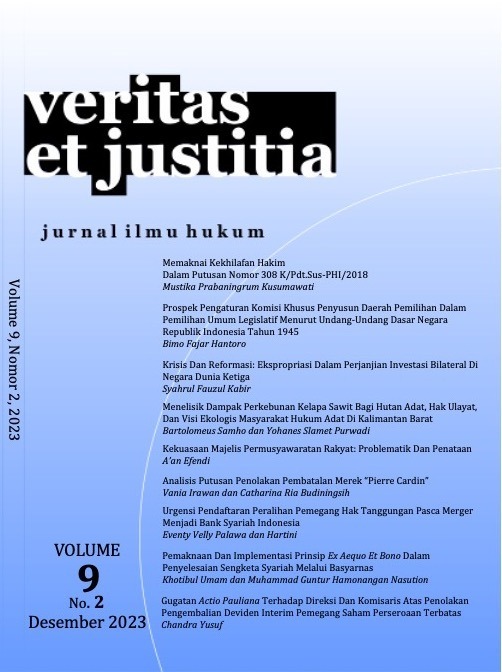MENELISIK DAMPAK PERKEBUNAN KELAPA SAWIT BAGI HUTAN ADAT, HAK ULAYAT, DAN VISI EKOLOGIS MASYARAKAT HUKUM ADAT DI KALIMANTAN BARAT
DOI:
https://doi.org/10.25123/vej.v9i2.6476Keywords:
oil palm plantations; indigenous forests; customary law community; customary rights; ecological vision.Abstract
According to the result of a research conducted in 2016 entitled "Changes in the Mindset of Dayak Indigenous Peoples in Sanggau Regency towards Customary Forests as a Result of Palm Oil Plantations", this article aims to describe the impact of oil palm plantations on indigenous forests, customary rights, and the ecological vision of Adat communities in West Kalimantan. The research method used is a qualitative method with a phenomenological approach. The findings of this research indicate that economic benefits obtained from oil palm plantations are not proportional with the ecological and social losses resulting from the impacts, both directly and indirectly. It is also found that Adat communities living around oil palm plantations often face the threat of horizontal conflicts due to competition over cultivated land and ecological threats in the form of floods and landslides. The findings within thisis useful to strengthen the understanding of the importance and necessity of developing oil palm plantations with due regard to the local wisdom and constructive ecological vision to maintain the existence of indigenous forests as customary rights. Therefore, land clearing for oil palm plantations must pay attention to local wisdom, preserving nature so that the sustainability of ecosystems and communities is guaranteed.
References
Buku:
Andasputra, Nico; Bamba, John; Petebang, Edi (Eds), Pelajaran Dari Masyarakat Dayak: Gerakan Sosial dan Resiliensi Ekologis di Kalimantan Barat, WWF-Biodiversity Support Program (BSP), Washington DC, USA dengan Institut Dayakologi (ID), Pontianak-Indonesia, 2001.
Baswori & Suwandi, Memahami Penelitian Kualitatif, Jakarta: Rineka Cipta, 2008.
Boff, Leonardo, Ecology & Liberation: A New Paradigm, Translated from the Italian by John Cumming, Orbis Books, Maryknoll, New York, 1995.
Bogdan, Robert dan Taylor, Steven. J, Introducing to Qualitative Methods: Phenomenological, New York: A Wiley Interscience Publication, 1975.
Chang, William, Moral Lingkungan Hidup, Yogyakarta, Kanisius, 2001.
Dirk van Hoogstraten, Hans, Deep Economy: Caring for Ecology, Humanity, and Religion, James Clarke & Co P.O. Box 60 Cambridge CB1 2NT, England, 2001.
Keraf, A. Sonny, Filsafat Lingkungan Hidup: Alam Sebagai Sebuah Sistem Kehidupan, Kanisius, Yogyakarta, 2014.
Lontan, J.U, Sejarah-Hukum Adat Dan Adat Istiadat Kalimantan Barat, Ofset Bumirestu, Jakarta, 1975.
Mariane, Irene. Kearifan Lokal Pengelolaan Hutan Adat, Jakarta, PT. RajaGrafindo Persada, 2014.
Paus Fransiskus, Ensiklik Laudato Si’, Tentang Perawatan Rumah Kita Bersama, diterjemahkan oleh Martin Harun OFM., Obor, 2015.
Riwut, Tjilik, Kalimantan Membangun, Jakarta, PT. Jakarta Agung Offset, 1979.
Jurnal dan Hasil Penelitian:
Akranudin dan Rupita, “Etnografi Konflik Masyarakat Batu Daya dengan Perusahaan PT. Swadaya Mukti Prakarsa di Simpang Dua, Ketapang, Kalimantan Barat”. Jurnal Dakwah dan Sosial. Vol. 3 No.01, hlm. 19-23. DOI: 10.37680/muharrik.v3i01.208, 2020.
Apo, Kristianus Damianus, “Tradisi Beuma dan Pandangan akan Alam Dayak Suaid sebagai Pelestarian Lingkungan. Balale”. Jurnal Antropologi Universitas Tangjungpura. Volume 3 Nomor 1 (e-ISSN 2774-4612), 2022.
Imam, Septarina; Muthia & Nahdah, “Perlindungan Hukum Atas Alih Fungsi Lahan Masyarakat Menjadi Lahan Sawit (Studi Kasus Masyarakat Antar Baru Dengan PT. Barito Putera Plantation Di Kab. Barito Kuala. Badamai”. Law Journal. Vol. 7. No. 1. DOI: 10.32801/damai.v7i1.10204, 2022.
Martono, H, Nilai-Nilai Religi Dalam Dalam Sastra Lisan Dayak Keninjal, Jurnal Pendidikan Sosiologi Dan Humaniora Untan. Vol. 1. No. 2. Edisi Oktober, 2010.
Ruslan, Ismail, “Perubahan Sosial dan Ekonomi Masyarakat Akibat Perkebunan Kelapa Sawit”. Al-Maslahah. Jurnal Ilmu Syariah. ISSN 2502-837. Vol. 9. No. 2. DOI: https://doi.org/10.24260/almaslahah.v9i2.685, 2014.
Samho, Bartolomeus & Purwadi, Yohanes Slamet, PERUBAHAN POLA PIKIR MASYARAKAT ADAT DAYAK DI KABUPATEN SANGGAU TERHADAP HUTAN ADAT SEBAGAI AKIBAT PERKEBUNAN KELAPA SAWIT. Lembaga Penelitian dan Pengabdian kepada Masyarakat Universitas Katolik Parahyangan, 2016.
Sondakhh, Jemmy, HAK MILIK ATAS TANAH MENURUT HUKUM ADAT (Eksistensi Pemanfaatan dan Tantangannya dalam Hukum Indonesia), Fakultas Hukum Universitas Sam Ratulangi, Manado, 2014.
Surambo, Achmad. et.al, Sistem Perkebunan Kelapa Sawit Memperlemah Posisi Perempuan. Laporan Penelitian Sawit Watch & Solidaritas Perempuan, 2010.
Waters, Malcolm, Modern Sociological Theory, London, Thousand Oaks, New Delhi: Sage Publications, 1994.
Situs Daring:
https://betahita.id/news/detail/7262/luas-mutakhir-kebun-sawit-indonesia .html.html#:~:text=%22Kementerian%20Pertanian%20mengeluarkan%20data%20termutakhir,98%20juta%20hektare%20per%202021.
https://repository.unpar.ac.id/handle/123456789/791
https://id.wikipedia.org/wiki/Kelapa_sawit
https://id.wikipedia.org/wiki/Hutan_adat
https://institutdayakologi.wordpress.com/2011/04/05/suku-dayak/
http://kisahasalusul.blogspot.com/2015/10/asal-usul-suku-dayak.html
http://setda.sanggau.go.id/index.php?option=com_content&view=article&id=37&Itemid=66
https://www.hrw.org/id/report/2019/09/22/333509
https://repository.unpar.ac.id/handle/123456789/791
https://peraturan.bpk.go.id/Home/Details/38771/uu-no-32-tahun-2009
https://peraturan.bpk.go.id/Home/Details/45373/uu-no-41-tahun-1999
https://peraturan.bpk.go.id/Home/Details/104060/permen-agrariakepala-bpn-no-5-tahun-2015
Peraturan Perundang-Undangan:
Undang-Undang Nomor 32 Tahun 2009.
Undang-Undang Kehutanan Nomor. 41 tahun 1999.
Peraturan Menteri Negara Agraria/Kepala Badan Pertanahan Nasional No. 5 Tahun 1999.
Putusan Mahkamah Konstitusi Nomor 35 Tahun 2012.
Downloads
Published
Issue
Section
License
Copyright (c) 2023 Bartolomeus Samho

This work is licensed under a Creative Commons Attribution-NonCommercial 4.0 International License.
Authors who publish with this journal agree to the following terms:
Authors retain copyright and grant the journal right of first publication with the work simultaneously licensed under a Creative Commons Attribution License that allows others to share the work with an acknowledgement of the work's authorship and initial publication in this journal.
Authors are able to enter into separate, additional contractual arrangements for the non-exclusive distribution of the journal's published version of the work (e.g., post it to an institutional repository or publish it in a book), with an acknowledgement of its initial publication in this journal.
Authors are permitted and encouraged to post their work online (e.g., in institutional repositories or on their website) prior to and during the submission process, as it can lead to productive exchanges, as well as earlier and greater citation of published work.
The Journal allow the author(s) to hold the copyright and to retian publishing rights without restrictions.




